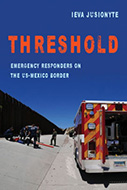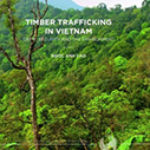Threshold: Emergency Responders On The U.S.-Mexico Border

Author: Ieva Jusiontye
Publisher: Oakland: University of California Press, 2018. 296p.
Reviewer: Howard Campbell | July 2019
Ieva Jusionyte is a rising star in anthropology. A young scholar, Jusiontye is already a Harvard professor with two ethnographic monographs under her belt, the second of which is Threshold. The title refers to the way borders, rather than being merely peripheries or margins, are places in which state power is concentrated and reproduced. Walls between nations, such as the U.S. border wall by Mexico, are the ultimate thresholds, solid structures that are not just passive objects, but geopolitical weapons. They are also actual physical weapons that harm the bodies of those who attempt to cross them without permission, in this case, Mexican immigrants and Central American refugees. They are part of an expanding U.S. policy that weaponizes space to deter migrants and mobility, often with devastating outcomes.
In 2015, Jusiontye, herself a trained firefighter, embedded with Nogales, Arizona emergency responders, and attended to numerous travelers injured attempting to cross the metal barrier dividing Arizona and Sonora. The greatest strength of her book is its rich narrative account of the lives of the firefighters and the many colorful and tragic stories of wounded immigrants, casualties of the sharp metal wall and twenty-foot drops down to the rocky desert floor. Jusiontye is a natural storyteller and her accounts of the perversity of U.S. border policies and bureaucracies juxtaposed with the everyday compassion of the emergency medical technicians, who are mostly local residents, and the suffering of the brave but vulnerable migrants make for compelling reading. So also do her stories about the many deliberate and unintended ecological, social, logistical and economic consequences of the border wall. Jusiontye also presents many insightful accounts of the myriad ways people from both sides of the border, including Nogales, Sonora (the adjacent sister city) subvert bureaucratic logics in order to humanize border life and simply get things done in practical ways.
This book is extremely timely, given the political importance of the border wall and immigration law enforcement to the Trump administration and the President’s reelection campaign. It lays bare the cruelty and vicious outcome of unilateral U.S. policies at the border. Long-time border scholars will likely agree with most of Jusiontye’s findings and arguments about the inhumanity of current border policy — the critiquing of which is like picking low-hanging fruit. Given the current immigration crisis and crime wave on the Mexican side of the international boundary, a more challenging task would be to envision and implement a less damaging human security policy [ but that falls outside the purview of the current study. Veteran anthropologists will be impressed with the deep immersion entailed by Jusiontye’s participatory fieldwork on the frontlines of border emergencies. Some critics may question the depth of the study, given that the research only commenced in 2015 and was already published in book form in 2018. Either way, Threshold is a fascinating ethnography of the violence wrought by U.S. border policies, the many human casualties, and the valiant efforts of binational groups and individuals to lessen the harm.
Howard Campbell, UTEP, Department of Sociology & Anthropology, El Paso, Texas


